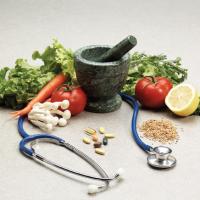This piece on food as medicine is excerpted from Annemarie Colbin’s book “Food and Healing”.
She is a Certified Health Education Specialist, Founder of Natural Gourmet Cookery School and Institute for Food and Health in New York City.
 We think of food as something that nourishes and keeps us alive.
We think of food as something that nourishes and keeps us alive.
But food can also heal our bodies (think of it as food as medicine).
Every culture has its own remedies for various problems, handed down through the generations.
Many childhood ailments respond very well to these traditional preparations.
Fevers
For thousands of years, an elevation in body temperature was considered beneficial.
But for the past 80 years or so, pharmacological medicine has insisted — wrongly — that fever is no good and must be lowered as soon as it appears.
If a spontaneous fever does not exceed 104 degrees and is not accompanied by other symptoms, try these natural ways to handle it and speed its passing:
- Keep the child warm, allowing body temperature to build,
- Do not offer solid food, or at least no protein or fats,
- Offer plenty of warm fluids (soup, tea, perhaps with ginger), to encourage perspiration,
- Give the child with chills a 15-minute warm bath at the same temperature as the fever,
- Offer soft barley or salt-free vegetable soup, after the fever breaks.
Because it strengthens the immune system, a simple fever can be allowed, and should even be encouraged, to run its course.
If it is a reaction to a drug or toxin, or if it lasts longer than two or three days, consult a competent health professional.
Coughs
Treating a cough depends on whether it is a useful cough that brings up mucus, or a useless, dry one caused by local irritation.
A useful cough should be encouraged and allowed to do its cleansing job.
Avoiding salty foods, which tend to tighten and hold back, will speed up the process.
Offer the child hot lemon tea, perhaps with honey, or hot pear juice with a cinnamon stick.
Try a hot compress on the chest.
A dry cough, which is like a “tickle,” can be stopped with a lick or two of something salty.
Try umeboshi plum paste or licorice tea.
Persistent, chronic coughs should be diagnosed and treated by a physician.
Sore Throats
Ginger or slippery elm tea are both very soothing.
Another effective remedy is a cold-water compress.
Wring out a large cotton handkerchief in cold tap water, fold it lengthwise, and wrap it around the throat.
Place a dry cotton towel, folded lengthwise, over the handkerchief.
Secure both in place with a woolen scarf. Leave on for at least two hours, up to overnight.
Earaches
In my experience, the major causes for ear infections in young children are dairy foods and a high-protein diet.
For mild earaches, try:
- A dairy-free diet.
- A hot compress on the ear. Wring out a washcloth in very hot water, fold, place on the ear, and secure with a woolen hat. This works well in the middle of the night.
Severe Earaches and Ear Infections
- Shoyu-kuzu with umeboshi once or twice a day for two days.
- Vegetable soup made with carrots, leeks, zucchini, celery and no salt.
- Grains and vegetables, including garlic, ginger and radishes.
- No dairy, animal protein, or fruit.
- Hot ginger compresses on the kidneys. Use once a day for three days, but not with infants or non-verbal children.
- If the ear is discharging, place a small, cold compress on the mastoid bone behind the ear, to keep the infection from spreading.
If we panic at minor symptoms and suppress them with aspirin, cough syrup, or antibiotics, we often worsen the condition.
But if we welcome and interpret minor disturbances as early warning signals, we can make dietary corrections to stimulate the body’s immune system and thereby avoid the aggravation of further health problems.